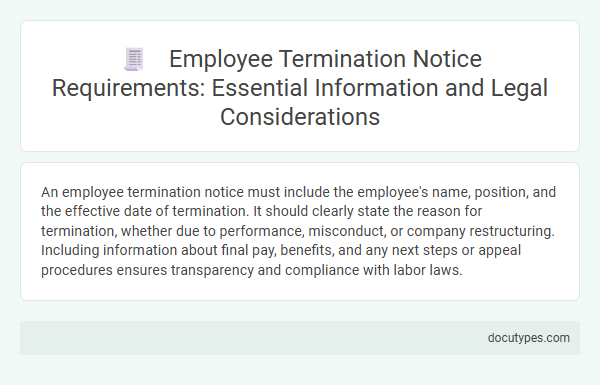An employee termination notice must include the employee's name, position, and the effective date of termination. It should clearly state the reason for termination, whether due to performance, misconduct, or company restructuring. Including information about final pay, benefits, and any next steps or appeal procedures ensures transparency and compliance with labor laws.
Overview of Employee Termination Notice
An employee termination notice must include key information such as the employee's name, position, and the effective date of termination. It should clearly state the reason for termination to ensure transparency and legal compliance.
The notice should also outline any final compensation details, including severance pay or outstanding benefits. Your communication must be concise and respectful to maintain professionalism during the termination process.
Legal Framework Governing Termination Notices
| Information Required in an Employee Termination Notice | Legal Framework Governing Termination Notices |
|---|---|
| Employee Identification Details | Most employment laws require clear identification of the employee, including full name, job title, and employee ID, to avoid miscommunication or disputes. |
| Termination Date | The legal framework often mandates a specific notice period. Termination date must comply with statutory or contractual requirements to ensure lawful separation. |
| Reason for Termination | Legislation such as the Fair Labor Standards Act or local labor codes require employers to state valid grounds for termination, protecting against wrongful dismissal claims. |
| Notice Period Length | Employment standards acts dictate minimum notice periods or pay in lieu of notice based on employee tenure and contract terms. |
| Details of Final Pay and Benefits | Legal statutes require disclosure of final paycheck details including accrued vacation, severance pay, and any outstanding bonuses. |
| Instructions for Return of Company Property | Termination notices often include directives for returning company assets, in accordance with organizational policies and to protect proprietary information. |
| Contact Information for Queries | Legal best practices recommend providing contact information for human resources or legal departments for dispute resolution or clarification. |
Types of Employment Contracts and Notice Implications
Employee termination notices must clearly state the type of employment contract, such as fixed-term, permanent, or casual, as this affects the notice period and legal obligations. Different contracts dictate specific notice requirements to ensure compliance with labor laws and protect both parties.
For fixed-term contracts, termination usually requires notice only at the contract's end unless otherwise specified. Permanent employees often have statutory or contractual notice periods, whereas casual workers may have minimal or no notice requirements depending on jurisdiction and company policy.
Mandatory Notice Periods by Jurisdiction
What information is required in an employee termination notice regarding mandatory notice periods by jurisdiction?
Employers must specify the length of the mandatory notice period according to the laws of the jurisdiction where the employment takes place. Your termination notice should clearly state the start and end dates of this notice period to ensure legal compliance.
Exceptions to Notice Requirements
Employee termination notices typically require specific information, but there are notable exceptions to these notice requirements under certain conditions. Understanding these exceptions is crucial for compliance with employment laws.
- Immediate Termination for Cause - Employers may bypass notice requirements if the employee is terminated for serious misconduct or breach of contract.
- Probationary Period Employment - Termination during an agreed probationary period often does not require formal notice, depending on regional laws and contract terms.
- Mutual Agreement - Both parties can waive the notice period if they agree to an immediate termination without prior notice.
Employer Obligations During Termination
Employers must include clear details such as the employee's name, position, and effective date of termination in the termination notice. The notice should also outline the reasons for termination, ensuring compliance with legal and contractual obligations. Employers are obligated to provide information on final payments, benefits, and any applicable severance packages.
Consequences of Failing to Provide Adequate Notice
An employee termination notice must include essential details to ensure legal compliance and clarity. Failing to provide adequate notice can result in serious consequences for your business.
- Legal Penalties - Employers may face fines or lawsuits if the termination notice does not meet statutory requirements.
- Reputational Damage - Inadequate notice can harm your company's reputation, impacting future hiring efforts and employee trust.
- Financial Liability - The employer might be obligated to pay severance or damages due to improper termination procedures.
Employee Rights and Remedies
An employee termination notice must include the reason for termination, the effective date, and any details about final pay or benefits. Your rights to severance pay, unemployment benefits, and appeal processes should be clearly stated to ensure transparency and legal compliance. Employers are required to inform you of available remedies if the termination is wrongful or discriminatory.
Best Practices for Delivering Termination Notices
Providing a clear and comprehensive employee termination notice is crucial for maintaining professionalism and minimizing misunderstandings. Best practices ensure the notice is respectful, legally compliant, and informative.
- Include Clear Reasoning - Specify the exact reasons for termination to avoid confusion and potential disputes.
- Outline Final Pay and Benefits - Detail information on final paycheck, severance, and benefits continuation to ensure transparency.
- State Important Dates - Indicate the effective termination date and any deadlines for returning company property or completing exit procedures.
Your termination notice should balance clarity and empathy while adhering to legal requirements.
What Information Is Required in an Employee Termination Notice? Infographic

